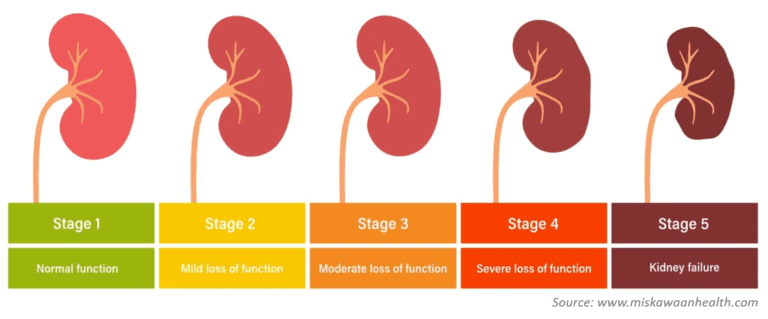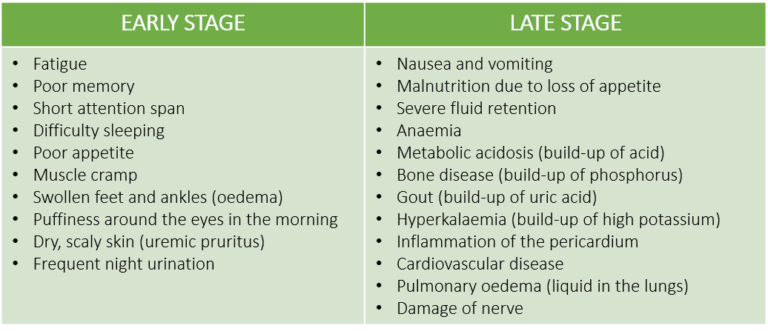Page Contents
Kidneys play an important homeostasis function that regulate pH by controlling the balance of water, sodium, chloride, potassium, calcium, magnesium, hydrogen ions, and phosphate.
Kidneys also help to remove waste products and toxins, excess water, and other impurities out of the blood that maintain stable blood pressure.
They also produce a hormone called renin that regulate blood pressure, and erythropoietin that acts on the bone marrow to produce red blood cells.
Statistics and trends
Cases of kidney disease has been on the rise. It is largely attributed to the unhealthy diet and lifestyle. According to statistics, 1 in 3 people in the general population worldwide has increased risk of Chronic Kidney Disease (CKD), and it estimates that 9 in 10 of those with CKD are unaware of their condition. With that, it estimates that 1 million people worldwide die from untreated kidney failure each year.
Another study shows that CKD is found to be most common in adults aged 65 years and older. Only 6% of those diagnosed with kidney disease are between the ages of 18 and 44 years, and there is 12% of the population fall between the ages of 45 and 64 years.
As shown in another report in US 2021, there are about 14% of women develop kidney disease as compared to 12% of men.
Types of kidney diseases
There are 2 main types of kidney diseases, i.e. acute and chronic (Figure 1).

Other types of kidney diseases include kidney stones, glomerulonephritis, polycystic kidney disease, Urinary Tract Infections (UTIs), and kidney cancer.
Development of kidney diseases
CKD is classified into 5 stages based on the efficiency of the kidneys’ function (Figure 2). At the early stage (Stage 1 – 3), usually there is no noticeable symptom, but the kidneys’ functions can decline gradually. At Stage 4, your kidneys may not function optimally and treatment may be required soon. Stage 5 is where kidney failure happens, this stage is also called End-stage Renal Disease (ESRD).

What causes kidney disease?
The most common cause of kidney disease is hypertension where the increased pressure in the bloodstream impose burden to the glomeruli (capillaries in the kidneys). When there are impurities blockages at the glomeruli, the blood pressure gets higher and causes more damages to the kidneys.
Another common cause of kidney disease is diabetes. The increased in blood sugar weaken and damages the blood vessels. Over time, it deteriorates the kidney functions and lead to kidney failure.
Hypertension and diabetes are common conditions among the older adults. Which is why kidney diseases are usually reported in elderly people. This situation may shift over time as the population of patients suffering hypertension and diabetes is getting younger especially in developed countries.
What are the symptoms?
Kidney diseases can be categorised into early and end stage (Figure 3). Early stage presents a milder symptoms, while late stage shows more complicated and severe symptoms.

Diagnosis and treatment
If you exhibit the above symptoms, doctor may perform more tests for the diagnosis of kidney diseases. The tests may include:
- Glomerular Filtration Rate (GFR) using plasma or urinary clearance of an exogenous filtration marker.
- Estimated GFR (eGFR) from the person’s serum creatinine and/or cystatin C levels.
- Blood test to measure Blood Urea Nitrogen (BUN).
- Blood test to measure serum creatinine level.
- Ultrasound or CT scan of the kidneys.
- Kidney biopsy.
- Urine test to measure Urine Albumin-to-Creatinine Ratio (UACR).
To date, there are only 2 ways to manage kidney failure, i.e. dialysis and kidney transplant.
- Dialysis is a mechanical filtration of blood performed outside your body. Through the dialysis machine, it filters extra fluid and waste out of your blood. It is important to note that dialysis can help to treat kidney disease, but it doesn’t cure it, you need a lifetime dialysis to sustain life.
- Kidney transplant could be an alternative to treat kidney disease. However, as with other transplant, you need to find the perfect match of donor and undergo lifetime immuno-suppressive drugs to ensure the foreign kidney does not get rejected by your body.
Even though there is no cure for chronic kidney disease, medications, diet and lifestyle modifications can help to relieve the symptoms and prevent it from further deterioration.
Living with ESRD
When CKD develops into ESRD, you may not be soon enough to get a transplant. The immediate solution is to depend on external assistance to perform the filtration function of the kidneys. The process is called dialysis. Do note that dialysis only helps to clean up your blood, it does not perform the other function of your kidneys, i.e. hormones production.
The two types of dialysis are haemodialysis and peritoneal dialysis. In haemodialysis, your blood is pumped out to an artificial kidney machine for filtration. Clean blood is then returned to your body through a tube that connects you to the machine. In peritoneal dialysis, your abdominal cavity (peritoneum) acts as a natural filter. We will dive more into dialysis topics in the future.
When you start to receive dialysis treatment, you have to follow very stringent diet restriction. For example:
- avoid salty foods, e.g. ham, bacon, sausage, preserved foods.
- avoid high potassium fruits such as bananas and avocados.
- limit phosphorus in your diet, for example, broccoli, mushrooms, milk, yogurt, cheese, etc.
- control fluid intake to reduce urine output.
- consume more protein.
How to prevent kidney diseases?
Even if you are in good health now, you may be at risk of developing kidney disease. If this situation occurs, your doctor may prescribe some medications or recommend diet and lifestyle modifications.
Medications:
- Angiotensin-converting enzyme (ACE) inhibitors or angiotensin receptor blockers (ARBs) can slow the progression of kidney disease and preserve kidney function.
- Cholesterol drugs can reduce blood cholesterol levels and maintain kidney health. Doctor may also prescribe drugs to relieve swelling (oedema) and treat anaemia.
- Insulin injections to manage diabetes.
- Avoid over-the-counter non-steroidal anti-inflammatory drugs (NSAIDs), many of these drugs can harm your kidneys.
Diet:
- Reduce consumption of foods that are high in cholesterol.
- Reduce salt intake.
- Consume a healthy and balanced diet that includes fresh fruits, vegetables, whole grains, and low fat dairy products.
- Limit alcohol consumption.

Conclusion
Kidney disease does not show noticeable symptoms at the early stage. You should not assume it is just another common condition and take it lightly.
It is important to have balanced and healthy diet, active lifestyle, healthy BMI, and stop the unhealthy habits such as drinking and smoking.
In additional, you should also go for annual health screening to check your blood creatinine and urine albumin levels. Should the range falls into the indicators for kidney disease, consult a medical professional for further investigations.

